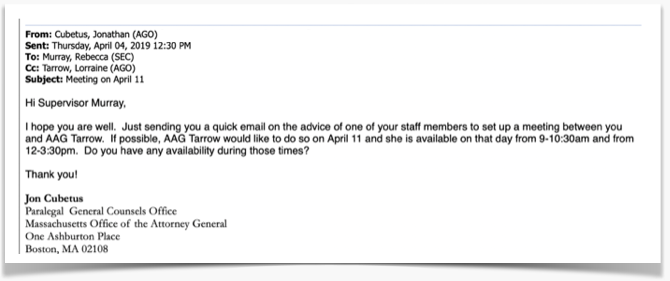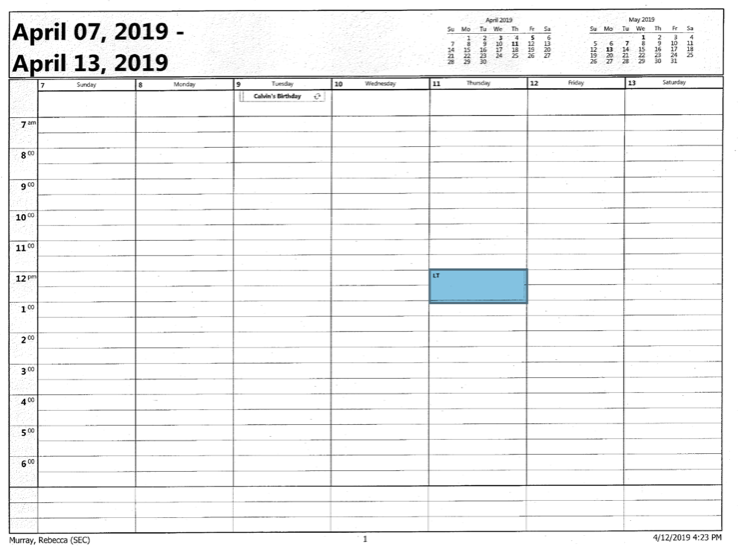In April, Climate Litigation Watch reported on a remarkable turn of events in the state attorneys’ general campaign to stop the public from learning the specifics of how elected law enforcement offices have come to be used by the Climate Litigation Industry assisting plaintiffs’ lawyers, activists and major political donors.
In short, the official tasked under Massachusetts law with ruling on open records appeals — the Secretary of State’s Supervisor of Records, Ms. Rebecca Murray — issued, then bizarrely rescinded, a proper, several-page and thoughtful ruling on appeal against OAG.
This involved six pages of emails with a plaintiffs’ lawyer (Matt Pawa) or an activist (Naomi Oreskes) both of who had sought “a single sympathetic attorney general” to investigate opponents of the climate agenda. It seems that climate activists believed that subpoenas in such investigations/litigation would help the activists get their desired tort litigation off the ground.
One of them presented at a “secret meeting” “about going after climate denialism—along with a bunch of state and local prosecutors”.
So their early work with attorneys general, including particularly their local AG, Massachusetts’ Maura Healey, is of great public interest. The Massachusetts OAG refused to release any part, at all, of what it acknowledged were six pages of emails with one or both of these parties in early 2016, when the latter were recruiting AGs to pursue their opponents, and to lend the tort bar a hand.
Not even the To, From and Date. Even that, OAG keened, “would likely impact” its investigation and litigation against what it has decided is prosecutable climate denialism. Impact as in… discredit? OAG didn’t say.
That’s not how the Massachusetts open records law works, however, as the Supervisor of Records explained to OAG in not one but two rulings against it.
Then, two days later, something very strange happened. Ms. Murray had an apparent epiphany, writing to pull back her second ruling telling OAG to straighten up, asserting that after sleeping on it she instead “decline[d] to opine”. The Supervisor of Records declared this was due to “an oversight”, specifically that OAG was engaged in litigation it states is related to the records it is withholding in full.
In such circumstances, she cited to statutory authority permitting her to deny the appeal. Which “declining to opine” of course does not do. (One supposes that Ms Murray’s eloquence two days prior in explaining the impropriety of OAG’s withholdings would make that even more awkward). As it is, the “oversight”, well, wasn’t. In that thoughtful ruling two days prior instructing OAG it was in the wrong, the Supervisor of Records had in fact directly acknowledged, several times, the “litigation” claim and rejected it as an insufficient basis for allowing OAG to withhold.
So, what, precisely, happened to cause this re-think two days later? Was there some behind the scenes advocacy, possibly even pressure employed?
Yep.
The appeals at issue involved a request by Chris Horner on behalf of the Competitive Enterprise Institute (CEI). That request sought certain correspondence from the approximate period during which AG Healey joined Al Gore and a handful of colleagues at a Manhattan press conference vowing to use their law enforcement offices to overcome democratic opposition to the climate agenda, including pursuing those dark forces they felt were responsible for this defeat. Briefing the AGs before they walked on to the stage was the same plaintiff’s lawyer whose correspondence this request sought.
After this odd turn of events the transparency group Energy Policy Advocates (EPA) — which also had an appeal pending before these same parties, and other related requests also sitting on the same Assistant Attorney General’s desk — requested Ms. Murray’s calendar for that week as well as any emails with OAG.
Well. This quite limited production of records includes emails arranging, on April 3, 2019, a meeting between the Records Supervisor and OAG, about something the parties elected to not commit to writing. The same is true for the calendar entry as well.
Specifically, one email (of three released) shows the Massachusetts Office of Attorney General’s Records Officer — Assistant Attorney General Lorraine Tarrow, who had been dealt both defeats by Ms. Murray’s opinions — requesting a meeting in Murray’s office around the time Murray’s opinion on appeal was due. Tarrow’s paralegal, Jonathan Cubetus, requested it, and it was clear the parties were not regular correspondents:
Hi Supervisor Murray,
I hope you are well. Just sending you a quick email on the advice of one of your staff members to set up a meeting between you and AAG Tarrow. If possible, AAG Tarrow would like to do so on April 11 and she is available on that day from 9-10:30am and from 12-3:30pm. Do you have any availability during those times?
Thank you!
Jon Cubetus

This might be about anything, of course. However, at the time of this request Ms. Tarrow did have at least two critical appeals before Ms. Murray of her refusals to produce records that we know AGs definitely do not want to become public.
A second released email shows Ms. Tarrow forwarding an email thread between EPA and Tarrow, on the same subject matter as both pending appeals. Tarrow includes no comment, indicating the parties had discussed the matter, presumably by telephone but certainly before the scheduled meeting.
Ms. Murray’s calendar shows one appointment for the week of April 7-13. It is on the requested date at the requested time — April 11, from 12-1 pm —
but she the entry records no details at all about the time being blocked out, only “LT” (presumably, initials for Lorraine Tarrow).

Subsequent requests for other weeks of Ms. Murray’s calendar show the few other meetings listed described with details such as “RCB Meeting, State House Library”, School Records Meeting. 17th Floor Conference Room”.
Now that we know there was indeed something afoot, the principal remaining mysteries are just how Ms. Murray characterized her scheduled ex parte discussion (see, e.g., 5 U.S.C. § 551(14), or 12 CFR § 263.9) with the serially defeated and obviously concerned Assistant Attorney General, how many times they spoke about these matters, and what was said.
Ex parte communications between Assistant Attorney General Tarrow and Supervisor Murray are troubling for a few reasons. First, Ex parte communications between lawyers and judges are forbidden in Massachusetts Rules of Professional Conduct and the Code of Massachusetts Regulations. The rationale is simple; it isn’t fair to allow one party to argue without affording the opposing party the same opportunity to challenge the claims advanced. But, this seemed to be a situation of unique concern to OAG.
Second, and very relevant to the present issue, the primary method the Supervisor of Records has to enforce a decision against OAG is to refer the scofflaw to…the Attorney General’s Office.. Lastly, it hard to see Murray’s decision to reverse her ruling as not being, at least partially, influenced by a closed-door conversation that others involved were not made aware of nor given the option to join.
As noted, ex parte communications are sanctionable when they occur during a “proceeding”. Proceeding is not defined in the public record laws. However, the administrative appellate process, a statutory creature outlined in the Massachusetts’ General Laws and Code of Massachusetts Regulations, is arguably a “proceeding”.
The closed-door communications between Murray and Tarrow therefore not only prompted a facially suspect reversal of a ruling already made, correctly and with coherent reasoning and precedent. They also raise serious questions about fundamental fairness about a matter that was already of great public interest. With poetic justice, it appears that it is the very public records law that these actions appear to have perverted that has exposed the effort to keep the decision-making off the record.
Note: An earlier version of this post stated that the calendar entry shown, revealing only LT, was subject to redaction. It appears that “LT” was in fact all Ms. Murray wrote about the meeting. That has been corrected.
